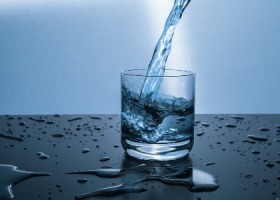Dehydration is a common and very serious condition for older adults – it can even turn fatal. Anujit Mitter tries to find out why prevention is the best thing to do but it’s much easier said than done—to increase their fluid intake.
For seniors, dehydration can cause many major health problems, including kidney stones, blood clot complications, passing out, rapid but weak pulse, lowered blood pressure. Being hydrated is also very important for certain medications to work properly.
Dr Avik Basu, general practitioner and intensivist, says: “Increased water loss through perspiration is common in summer months. Elderly people are at an increased risk of succumbing to dehydration.”
On how to get senior citizens to drink more water, he adds: “Senior citizens must drink at least 3 litres of plain water every day. Most of us prefer cold water or fruit juice over plain water. Chilled drinks are a no-no for the elderly since they may catch cold or even develop pneumonia in certain cases. Fruit juice is a better option.”
On how much water per day is adequate for the elderly, Dr Basu replies: “The water requirement will vary if there is any underlying disease viz. cardiac failure, renal or liver disease. These patients will need to take comparatively lesser amount of water to prevent any fluid overload.”
On any particular advice for diabetics/ high BP patients, the doctor says: “Chronic hypertensive patients are dehydrated more compared to normal people. So, they require to drink sufficient water. Similar advice is given to diabetic patients. But if they have an associated nephropathy i.e. renal disease or any cardiac failure, then obviously the level of fluid consumption must be cut down considerably.”
Often, seniors complain about prolonged time for healing in case of cuts and bruises. Dr Basu is quick to reply: “Since water forms the main bulk of the blood, so a reduction in body water will definitely lead to alteration of certain blood parameters e.g. cellular ratios, blood flow. Less blood flow will decrease the rate of delivery of nutrients to the cells and thus delay wound healing. There will be increased population of inflammatory cells nearer the tissues that may lead to persistence of inflammation in and around the site of injury. So, a patient with any bodily injury must be adequately hydrated.”
On how differently dehydration affects the elderly in comparison to young adults or middle-aged adults, he says: “We shouldn’t advise overzealous consumption of water as that may predispose the subject to cardiac or renal morbidity. For a young adult, the body is more prompt to mount compensatory mechanisms to fight the dehydration, but that isn’t so in case of an elderly. That is why maintenance of hydration is equally important for both the elderly and younger adults.”
- Less constipation / less need for laxatives
- Fewer falls
- Reduced risk of urinary tract infection (UTI)
- Men may have reduced risk of bladder cancer
- Reduced risk of colorectal cancer
1. Remember there are many sources of fluids
Older adults don’t have to drink only plain water to get hydrated. Coffee, tea, fruit juice, sweetened beverages, fruits, and vegetables all contain water. If the senior really hates drinking fluids, serve them more foods with high water content to increase their hydration.
Sometimes, making it easy for senior citizens to serve themselves could encourage them to drink more water. Try putting a lightweight pitcher of water and a cup near their favourite seat.
Those who like savouries may enjoy drinking hot soup broth. The broth can come from a can, box, or powder, but some older adults really like it – especially in cold weather.
Home-made popsicles made from fruit juice or a mix of juice and water are a great summer treat. But they’re also a great way to get fluids into your senior.
Some older adults may really resist drinking fluids. If so, smoothies, milkshakes, Ensure, or sports drinks can do the trick. Sometimes they’ll like the flavour or texture and be willing to drink these beverages.
What’s important is to be creative and arm oneself with many different ideas in case their preferences change.
Be careful of health issues and check with the doctor in case of questions. For example, high sodium drinks should not be given to someone with high blood pressure, milkshakes to an overweight person with high cholesterol or heavily sweetened drinks to a diabetic.
Pic credit: https://pxhere.com/en/photo/1569315



